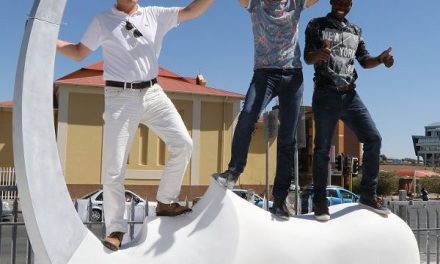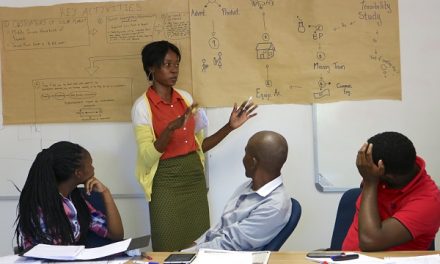
Learning about Climate Change

The wonder of learning something new is reflected on the faces of the children attending the Annual ASPnet Camp at Gobabeb. Here, the mysteries of the desert are explained to the children.
The camp was held over the long weekend at the Gobabeb Research Centre along the Kuiseb River and at Coastal High School in Swakopmund.
The theme of the UNESCO Associated Schools Project Network (ASPnet) Annual Camp was “Driving education for sustainable development : The impact of climate change on sustainable living.”
This annual camp falls under the overall framework of UNESCO’s work on Education for Sustainable Development (ESD). As the designated lead agency for the implementation of the Decade of Education for Sustainable Development (DESD), “UNESCO seeks to integrate the principles, values, and practices of sustainable development into all aspects of education and learning, to address the environmental, social, economic and cultural problems we face in the 21st century” said Mr. Samuel Diekert, Education Specialist from the UNESCO Windhoek National Office, in his opening remarks at Gobabeb.
A total of 149 participants, consisting of learners, ASPnet coordinators and principals, from all over Namibia, attended the camp. The event provided a platform for the each of the 20 participating schools to show their research presentations, and to debate and discuss various aspects of climate change as it affects biodiversity, agriculture, culture, life styles, land management and water security.
ASPnet was launched by UNESCO in 1953 with 33 secondary schools in 15 Member States to promote education for international understanding and peace.
The programme has emerged as one of UNESCO’s most successful long-term initiatives. “ASPnet has become a unique network committed to reinforcing the humanistic, ethical, cultural and international dimensions of education whilst ensuring the sharing and exchange of good practises nationally and internationally”, stated Diekert.
In her welcoming remarks at Coastal High School, the Ms N. Goagoses, Chief Regional Officer of the Erongo Regional Council, said she was overwhelmed to see so many schools promoting quality education based on the four pillars of learning namely, learning to know, learning to do, learning to be and learning to live together.
She complimented the learners for promoting the UNESCO ideals of peace, tolerance, mutual understanding and intellectual learning, to share research findings on the theme and learn about local places of cultural and historical significance.
As the world’s largest network of schools and teacher training institutes, the ASPnet serves as a laboratory for innovative pedagogical approaches, and strives to support teachers and learners in their efforts to address today’s changing educational needs and tomorrow’s challenges. Dr. Marius Kudumo, Secretary General of the Namibian National Commission for UNESCO said the camp raised awareness among the learners and teachers on the importance of education for sustainable development and the impact of climate change. He said this camp also concretized the four pillars of learning.
“I learned so much from the camp and got to experience Namibia in a whole different light, meeting different people from all over the nation. It was truly an experience that will last me a lifetime,” said Deborah Nangula, Vice Head-girl from Concordia College, also a participating school from Windhoek.
The camp was supported by key partners such as the UNESCO Windhoek National Office, Alason Trading Enterprise, Seal Caterers, Independence Caterers, Kunene Caterers, Coca-Cola, Shoprite, Namibia Publishing House and the Ohlthaver & List Group.













































